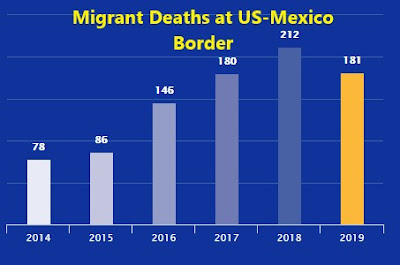Putting Oscar and Valeria's deaths in context
The deaths of Oscar and Valeria Martinez continue to echo in El Salvador. Their attempt to cross the dangerous waters of the Rio Grande was forced by exclusionary policies of the US government which drastically limit the number of asylum seekers who can cross a bridge at an official port of entry each day. Those policies instead push desperate migrants into the water or into the dessert away from walls and border patrols in their attempt to enter the US, often with fatal results.
We know Oscar and Valeria's story because of one emotionally dramatic photograph. Yet they are just two of the scores of migrants who have continued to die making attempts to cross the US border. Data from the Missing Migrants Project, which tracks migrant disappearances and deaths worldwide, documents at least 181 deaths along the US-Mexico border so far this year, or almost exactly one per day. This compares to 212 deaths in all of 2018. The number of deaths has increased every year since 2014:
Yet instead of steps to reduce migrant deaths, this week brought the news that the US government will retry its case against Scott Warren of No More Deaths, the humanitarian activist charged with aiding migrants in the Arizona desert. In June, a jury could not reach a verdict when the government prosecuted Warren for providing humanitarian assistance to two migrants he encountered in need of water and medical attention in the border area. The government will try again to prove its case in a prosecution which critics see as harassment and intimidation of those who would provide humanitarian aid.
This makes it an appropriate time to view the documentary Lamento con Alas (“Lament with Wings”) a short documentary about good Samaritans Lavoyger Durham and Lori Baker who attempt to make a difference during the immigration surge in the summer of 2014. In parallels to the Scott Warren case, Durham breaks stereotypes as a Texan rancher who sets up water stations that keep immigrants alive even as they illegally cross his land. And Baker, an associate professor of anthropology at Baylor University, exhumes deceased immigrants from unmarked graves and works to return the dead to their families in Latin America. She founded the Reuniting Families Project to establish a system for DNA analysis and identification of these deceased migrants. Durham and Baker both work to bring dignity to migrants who cross the US border in dangerous conditions.... The original score for the documentary was crafted by Carlos Colón, a Salvadoran composer who fled to Guatemala and then the United States as a refugee from El Salvador’s civil war.
We know Oscar and Valeria's story because of one emotionally dramatic photograph. Yet they are just two of the scores of migrants who have continued to die making attempts to cross the US border. Data from the Missing Migrants Project, which tracks migrant disappearances and deaths worldwide, documents at least 181 deaths along the US-Mexico border so far this year, or almost exactly one per day. This compares to 212 deaths in all of 2018. The number of deaths has increased every year since 2014:
 |
| Source: Missing Migrants Project |
Yet instead of steps to reduce migrant deaths, this week brought the news that the US government will retry its case against Scott Warren of No More Deaths, the humanitarian activist charged with aiding migrants in the Arizona desert. In June, a jury could not reach a verdict when the government prosecuted Warren for providing humanitarian assistance to two migrants he encountered in need of water and medical attention in the border area. The government will try again to prove its case in a prosecution which critics see as harassment and intimidation of those who would provide humanitarian aid.
This makes it an appropriate time to view the documentary Lamento con Alas (“Lament with Wings”) a short documentary about good Samaritans Lavoyger Durham and Lori Baker who attempt to make a difference during the immigration surge in the summer of 2014. In parallels to the Scott Warren case, Durham breaks stereotypes as a Texan rancher who sets up water stations that keep immigrants alive even as they illegally cross his land. And Baker, an associate professor of anthropology at Baylor University, exhumes deceased immigrants from unmarked graves and works to return the dead to their families in Latin America. She founded the Reuniting Families Project to establish a system for DNA analysis and identification of these deceased migrants. Durham and Baker both work to bring dignity to migrants who cross the US border in dangerous conditions.... The original score for the documentary was crafted by Carlos Colón, a Salvadoran composer who fled to Guatemala and then the United States as a refugee from El Salvador’s civil war.
Comments